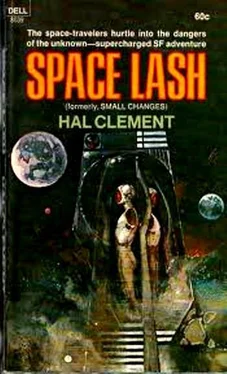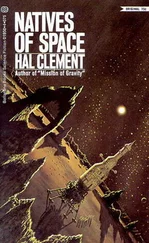Hal Clement - Space Lash
Здесь есть возможность читать онлайн «Hal Clement - Space Lash» весь текст электронной книги совершенно бесплатно (целиком полную версию без сокращений). В некоторых случаях можно слушать аудио, скачать через торрент в формате fb2 и присутствует краткое содержание. Год выпуска: 1969, Жанр: Фантастика и фэнтези, на английском языке. Описание произведения, (предисловие) а так же отзывы посетителей доступны на портале библиотеки ЛибКат.
- Название:Space Lash
- Автор:
- Жанр:
- Год:1969
- ISBN:нет данных
- Рейтинг книги:3 / 5. Голосов: 1
-
Избранное:Добавить в избранное
- Отзывы:
-
Ваша оценка:
- 60
- 1
- 2
- 3
- 4
- 5
Space Lash: краткое содержание, описание и аннотация
Предлагаем к чтению аннотацию, описание, краткое содержание или предисловие (зависит от того, что написал сам автор книги «Space Lash»). Если вы не нашли необходимую информацию о книге — напишите в комментариях, мы постараемся отыскать её.
Space Lash — читать онлайн бесплатно полную книгу (весь текст) целиком
Ниже представлен текст книги, разбитый по страницам. Система сохранения места последней прочитанной страницы, позволяет с удобством читать онлайн бесплатно книгу «Space Lash», без необходимости каждый раз заново искать на чём Вы остановились. Поставьте закладку, и сможете в любой момент перейти на страницу, на которой закончили чтение.
Интервал:
Закладка:
“You don't know, and neither do I,” retorted Ries. “We're supposed to pass something like a hundred thousand miles from the photosphere. You know as well as I do that the only comet ever to do that came away from the sun as two comets. Nobody ever claimed that it boiled away.”
“You knew that when you signed up. No one blackmailed you. No one would — at least, no one who's here now.” The commander regretted that remark the instant he had made it, but saw no way to retract it. He was afraid for a moment that Ries might make a retort which he couldn't possibly ignore, and was relieved when the instrument man reached for a handhold and propelled himself out of the room. A moment later he forgot the whole incident as a physicist at one of the panels suddenly called out.
“On your toes, all of you! X-ray count is going up — maybe a flare. Anyone who cares, get his gear grinding!” For a moment there was a scene of confusion. Some of the men were drifting free, out of reach of handholds; it took these some seconds to get swimming. Others, more skilled in weightless maneuvering, had kicked off from the nearest wall in the direction of whatever piece of recording machinery they most cherished, but not all of these had made due allowance for the traffic. By the time everyone was strapped in his proper place, Ries was back in the room, his face as expressionless as though nothing had been said a few moments before. His eyes kept swiveling from one station to another; if anyone had been looking at him, they would have supposed he was just waiting for something to break down. He was.
To his surprise, nothing did. The flare ran its course, with instruments humming and clicking serenely and no word of complaint from their attendants. Ries seemed almost disappointed; at least Pawlak, the power plant engineer who was about the only man on board who really liked the instrument specialist, suspected that he was.
“C'mon, Grump,” was this individual's remark when everything seemed to have settled down once more. “Let's go outside and bring in the magazine from the monitor camera. Maybe something will have gone wrong with it; you said you didn't trust that remote-control system.''
Ries almost brightened.
“All right. These astronomers will probably be howling for pictures in five minutes anyway, so they can tell each other they predicted everything correctly. Suit up.” They left the room together with no one but the commander noting their departure.
There was little space outside the ship's air lock. The rocket had been brought as close to the center of the comet as measurement would permit, through a tunnel just barely big enough for the purpose. Five more smaller tunnels had been drilled, along three mutually perpendicular axes, to let out the exhaust of the fusion-powered reaction motors which were to use the comet's own mass to change its course. One other passageway, deliberately and carefully zigzagged, had been cut for personnel. Once the sunward course had been established all the tunnels except the last had been filled with “snow” — crushed comet material from near the ship. The cavern left by the removal of this and the exhaust mass was the only open space near the vessel, and even that was not too near. No one had dared weaken the structure of the big iceberg too close to the rocket; after all, one comet had been seen to divide as it passed the sun.
The monitor camera was some distance from the mouth of the tunnel — necessarily; the passage had been located very carefully. It opened in the “northern” hemisphere, as determined by direction of rotation, so that the camera could be placed at its mouth during perihelion passage and get continuous coverage. This meant, however, that in the comet's present orbital position the sun did not rise at all at the tunnel mouth. Since pictures had to be taken anyway, the camera was at the moment in the southern hemisphere, about a mile from the tunnel mouth.
Some care was needed in reaching it. A space-suited man with a mass of two hundred fifty pounds weighed something like a quarter of an ounce at the comet's surface, and could step away at several times the local escape velocity if he wished — or, for that matter, if he merely forgot himself. A dropped tool, given only the slightest accidental shove sideways, could easily go into orbit about the comet — or leave it permanently. That problem had been solved, though, after a fashion. Ries and Pawlak attached their suits together with a snap-ended coiled length of cable; then they picked up the end of something resembling a length of fine-linked chain which extended off to the southwest and disappeared quickly over the near horizon — or was it around the corner? Was the comet's surface below them, or beside or above? There was not enough weight to give a man the comforting sensation of a definite “up” and “down.” The chain had a loop at the end, and both men put one arm through this. Then Ries waved his free arm three times as a signal, and they jumped straight up together on the third wave.
It was not such a ridiculous maneuver if one remembered the chain. This remained tight as the men rose, and pulled them gradually into an arc toward the southwest.
Partway up, they emerged from the comet's shadow, the metal suits glowing like miniature suns themselves. The great, gaseous envelope of a comet looks impressive from outside, seen against a background of black space; but it means exactly nothing as protection from sunlight even at Earth's distance from the sun. At twenty million miles it is much less, if such a thing is possible. The suits were excellent reflectors, but as a necessary consequence they were very poor radiators. Their temperature climbed more slowly than that of the proverbial black body, but it would climb much higher if given time. There would be perhaps thirty minutes before the suits would be too hot for life; and that, of course, was the reason for the leap.
A one-mile walk on the surface of the comet would take far more than half an hour if one intended to stay below circular velocity; swinging to their goal as the bobs on an inverted pendulum, speed limited only by the strength of their legs, should take between ten and twelve minutes. There were rockets on their suits which could have cut even that time down by quite a factor, but neither man thought of using them. They were for emergency; if the line holding them to the comet were to part, for example, the motors would come in handy. Not until.
They reached the peak of their arc, the chain pointing straight “down” toward the comet. Their goal had been visible for several minutes, and they had been trying to judge how close to it they would land. A direct hit was nearly impossible; even if they had been good enough to jump exactly straight up, the problem was complicated by the comet's rotation. As it turned out, the error was about two hundred yards, fairly small as such things went.
The landing maneuver was complicated-looking: but logical. Half a minute before touchdown, Ries braced his feet against Pawlak and pushed. The engineer kept his grip on the chain and stayed in “orbit” while his companion left him in an apparently straight line. About fifteen seconds sufficed to separate them by the full length of the connecting snap line; the elasticity of this promptly started them back together, though at a much lower speed than they had moved apart. Just before they touched the surface, Ries noted which side of the camera the snap line was about to land on, and deliberately whipped it so that it fell on the other side; then, when both men took up slack, it snubbed against the camera mounting. Even though both men bounced on landing — it was nearly impossible to take up exactly the right amount of energy by muscle control alone — they were secure. Ries sent a couple more loops rippling down the line and around the camera mount — a trick which had taken some practice to perfect, where there was no gravity to help — and the two men pulled themselves over to their goal. The tendency to whip around it like a mishandled yo-yo as they drew closer was a nuisance but not a catastrophe; both were perfectly familiar with the conservation of angular momentum.
Читать дальшеИнтервал:
Закладка:
Похожие книги на «Space Lash»
Представляем Вашему вниманию похожие книги на «Space Lash» списком для выбора. Мы отобрали схожую по названию и смыслу литературу в надежде предоставить читателям больше вариантов отыскать новые, интересные, ещё непрочитанные произведения.
Обсуждение, отзывы о книге «Space Lash» и просто собственные мнения читателей. Оставьте ваши комментарии, напишите, что Вы думаете о произведении, его смысле или главных героях. Укажите что конкретно понравилось, а что нет, и почему Вы так считаете.












